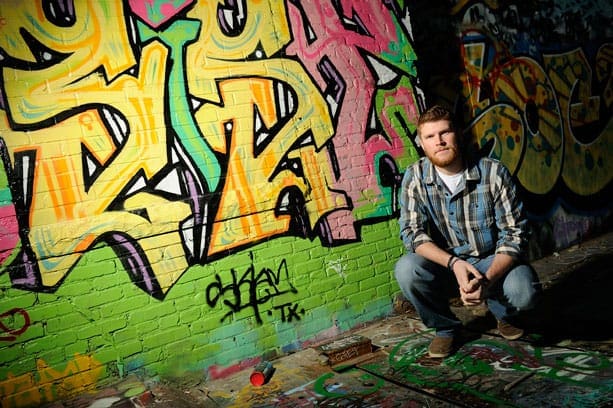Growing up in Houston, William McCance ’12 never saw much graffiti. Then he came to Baltimore, where its sweeping strokes are everywhere, from abandoned buildings to community centers. Local graffiti culture encompasses decades of history, he learned, but some of it is also fleeting. “You find [a piece] you like, and you go back a week later and the city has painted over it,” he says.
So McCance, an English and Writing Seminars double major, decided to shoot a documentary about the city’s graffiti culture before it changes once again. He’ll complete the project this year with support from a new program called the Dean’s Undergraduate Research Awards (DURA).

William McCance ’12 received a Dean’s Undergraduate Research Award to film a documentary on Baltimore street art.
Will Kirk / Homewoodphoto.jhu.edu
Created for undergraduate students in the Krieger School, the DURA program provides $500 to $3,000 grants to support research in the humanities, social sciences, and physical sciences, and requires a faculty mentor. Each department has named its award after one of its distinguished late faculty members. (McCance is the recipient of the Elliot Coleman Award in Writing, Speech, and Drama.) In its first semester, the program has had 51 applications.
As participants in the first cohort, McCance and 10 other undergraduate students are working on diverse projects, from an intense study of a 15th-century sculpture by Italian artist Agostino di Duccio, to a review of the money supply in countries with currency boards.
“Research is the defining cultural tradition of Johns Hopkins,” says Krieger School Dean Katherine Newman, who instituted the new grants. “We wanted to extend that experience all the way down to the youngest members of our community, our undergraduates.” As such, the DURA program joins the Woodrow Wilson Undergraduate Research Fellowship Program and the Provost’s Undergraduate Research Awards, two other scholarship programs that support undergraduate research at Johns Hopkins.
Senior Lily Newman received the Owen Hannaway Award and is researching the history of hospital medical waste in the 19th and 20th centuries and comparing historical and current practices. Three other students received the Bianca Thiesen Award and are working with Research Professor Bernadette Wegenstein to create a documentary on breast cancer and how it is connected to cultural perceptions of beauty and femininity. In January, Wenchi Wei ’12, a double-degree student in international studies and East Asian studies, spent nearly three weeks in Taiwan researching the positive shift in the country’s relations with China. Because her trip coincided with Taiwan’s election season, she also talked to supporters of re-elected president Ma Ying-jeou, as well as members of the opposing party.
“I’ve been thinking about this project for a while,” says Wei, recipient of the Milton Cummings Award. “This has implications for how to change such arrangements in other areas that are filled with conflict. The DURA funding [was] crucial for me being able to complete my research.”
Steven David, vice dean for undergraduate education, says the opportunity to work collaboratively with faculty is an important part of the program. “At a research university, sometimes it’s hard to get to know a faculty member,” he says. “This will give students a chance to get to know someone who can write recommendations and serve as a mentor. It’s a good way to establish that kind of relationship.”
Newman notes that the benefits for students go far beyond developing research skills. “The great pleasure and intrinsic value of discovery are by far the most important things that come out of this,” she says. “This is the opportunity to contribute new knowledge.”



